

Échec du chargement de la page. Le Monde.fr | • Mis à jour le | Par Angela Bolis.
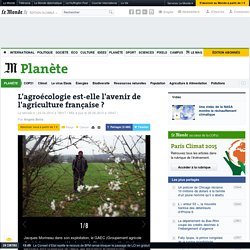
Nourrir le monde avec l'agriculture bio (Jacques Caplat) Redesigning Civilization with Permaculture. Ce qu'ils mangent en une semaine... voyage à travers les familles. Savez-vous combien dépense votre famille chaque semaine en épicerie ?

India's rice revolution. Indian farmers better than scientists: Nobel laureate Joseph Stiglitz. Agriculture scientists from across the world should visit indian farmlands to learn and be inspired by them, said the professor of economics at the prestigious Columbia University.
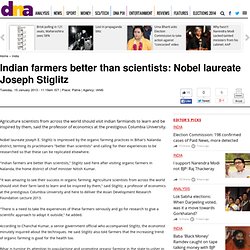
Nobel laureate Joseph E. Hult Prize: start-up accelerator for social entrepreneurship. Farmers are the ones ploughing money into agriculture. New data compiled for the Food and Agriculture Organisation's State of Food and Agriculture report, published on Thursday, shows that farmers are, by far, the greatest source of investment in agriculture.
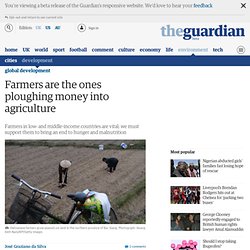
Farmers in low- and middle-income countries invest more than $170bn (£105bn) a year in their farms – about $150 (£93) a farmer. This is three times as much as all other sources of investment combined, four times more than the public sector's contribution and more than 50 times the size of official development assistance to those countries. Farmers' investment decisions are directly influenced by the investment climate in which they operate. In other words, the crucial factor in stimulating agricultural investment is not the size of government investments – although these need to grow too – but whether, and to what extent, developing country governments can provide adequate conditions for farmers to invest.
Smallholders need special attention. Presque la moitié de la nourriture mondiale serait gaspillée. Plus de 240 000 tonnes de nourriture finissent à la poubelle chaque jour en Europe. 5 Sure Ways to Eat Healthier...Really. In my last article, I shared five of my favorite foods that support a sound body, mind, and spirit.
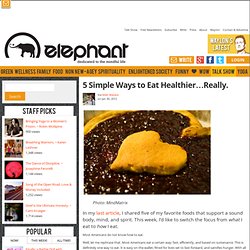
This week, I’d like to switch the focus from what I eat to how I eat. Most Americans do not know how to eat. Well, let me rephrase that. Most Americans eat a certain way: fast, efficiently, and based on sustenance. Bhutan Bets Organic Agriculture Is The Road To Happiness : The Salt. Hide captionA Bhutanese farmer puts her harvest of chilies on the roof of a shed to dry and protect it from wild boars, deer, and monkeys in 2006.
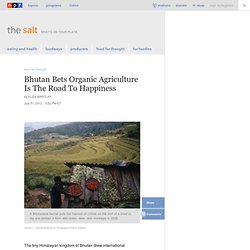
James L. Stanfield/National Geographic/Getty Images A Bhutanese farmer puts her harvest of chilies on the roof of a shed to dry and protect it from wild boars, deer, and monkeys in 2006. The tiny Himalayan kingdom of Bhutan drew international attention a few years back for saying gross national happiness should trump gross domestic product when measuring a nation's progress. If you're going to prioritize happiness, the Bhutanese thinking goes, you'd better include the environment and spiritual and mental well-being in your calculations.
But Bhutan, which has only 700,000 people — most of whom are farmers — has another shot at international fame if it can make good on a recent pledge to become the first country in the world to convert to a 100 percent organic agricultural system. Objectif Développement - Nouveaux regards sur les pays du sud par l'Agence Française de Développement. BlogAccess to Food and Improved Nutrition at the Base of the Pyramid. Improving food and nutrition security through better availability, accessibility, and utilization of food and food products is another complex challenge.
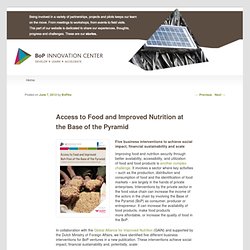
It involves a sector where key activities – such as the production, distribution and consumption of food and the identification of food markets – are largely in the hands of private enterprises. Interventions by the private sector in the food value chain can increase the income of the actors in the chain by involving the Base of the Pyramid (BoP) as consumer, producer or entrepreneur. It can increase the availability of food products, make food products more affordable, or increase the quality of food in the BoP.
In collaboration with the Global Alliance for Improved Nutrition (GAIN) and supported by the Dutch Ministry of Foreign Affairs, we have identified five different business interventions for BoP ventures in a new publication. These interventions achieve social impact, financial sustainability and, potentially, scale: Opinion / Columns : Taking the poison out of our food. I am not someone who usually goes shopping for vegetables or even other food stuff.

My present professional requirements don’t allow me this luxury. But I remember when I was a child I would often accompany my mother or my aunt when they went shopping for vegetables, fruits and other food stuff. I remember being thoroughly bored during these trips. They would spend hours selecting vegetables, examining each fruit or vegetable with great interest, pointing out flaws and insisting on the best quality and the most fresh food, and constantly comparing the quality offered by different sellers. Quand l'industrie de la viande dévore la planète. Les projections démographiques moyennes de l’Organisation des Nations unies (ONU) montrent que la planète accueillera neuf milliards de personnes en 2050, date à laquelle la population mondiale commencera à se stabiliser.
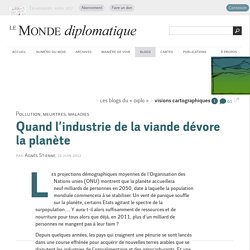
Un vent de panique souffle sur la planète, certains Etats agitant le spectre de la surpopulation… Y aura-t-il alors suffisamment de ressources et de nourriture pour tous alors que déjà, en 2011, plus d’un milliard de personnes ne mangent pas à leur faim ? Depuis quelques années, les pays qui craignent une pénurie se sont lancés dans une course effrénée pour acquérir de nouvelles terres arables que se disputent les industries de l’agroalimentaire et des agrocarburants.
Et une violente controverse oppose ceux qui veulent utiliser les produits agricoles pour faire tourner les moteurs à ceux qui préféreraient qu’on nourrisse les êtres humains. Nous sommes deux milliards à trop manger. Toxin from GM crops found in human blood: Study : North, News. Dinesh C.
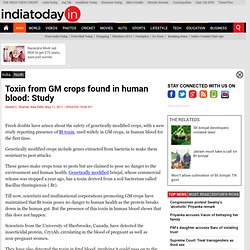
Sharma New Delhi, May 11, 2011 | UPDATED 19:06 IST Fresh doubts have arisen about the safety of genetically modified crops, with a new study reporting presence of Bt toxin, used widely in GM crops, in human blood for the first time. Genetically modified crops include genes extracted from bacteria to make them resistant to pest attacks. These genes make crops toxic to pests but are claimed to pose no danger to the environment and human health. Genetically modified brinjal, whose commercial release was stopped a year ago, has a toxin derived from a soil bacterium called Bacillus thuringiensis ( Bt).
Till now, scientists and multinational corporations promoting GM crops have maintained that Bt toxin poses no danger to human health as the protein breaks down in the human gut. Tribune: Inventer une agriculture «écologiquement intensive» What's Wrong with Our Food System? (Scaling) Faim au Sahel: pourquoi rien ne change. Après les crises alimentaires de 2005, de 2008 et de 2010, les prévisions étaient plus que pessimistes en 2012. Les ONG avaient pourtant lancé l'alerte dès la fin 2011. En vain. Et pourtant, on le sait, la région du Sahel est particulièrement fragile. Barilla CFN - Le Centre de Barilla pour l'alimentation et la nutrition.
Chaque année 30% de la nourriture comestible est gaspillée.